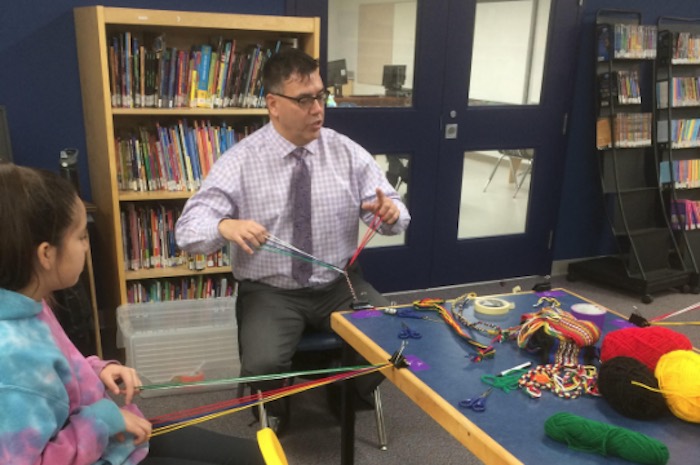Education
Red Deer Public teacher receives provincial award for infusing Indigenous culture into the classroom

With a commitment to advancing Indigenous education in Red Deer Public Schools and across the province, and a passion for teaching students First Nations, Métis and Inuit culture, one local teacher has been recognized with a prestigious provincial award.
Terry Lakey, a teacher with Red Deer Public’s Learning Services, has been awarded the Outstanding Indigenous Educator Award from the Alberta Teachers’ Association – Indigenous Education Council.
“It was very exciting and I feel honoured to receive this award,” said Terry, who added his inspiration comes from his mom. “I remember the day I told my mom I was going to be a teacher. She was over the moon, because mom, being an Indian Residential School survivor, was looking forward to me making the educational experience for children way better than what she experienced. I owe everything to her and her dedication to us as her six children that she raised.”
Terry, who is in his 25th year of teaching, has been in his current role at Red Deer Public Schools for the last five years. He develops First Nations, Métis and Inuit classroom resources for Red Deer Public Schools. He is also sought after outside the Division to provide in-services and help develop resources in other school divisions across the province.
“We help develop curriculum, form relationships with elders and partners in our community, find resources for staff so they feel they are supported when it comes to presenting authentic and accurate information as it relates to their programs of studies at the grade levels they teach,” he said. “It’s all connected to what is taught in the classroom.”
Terry said there are many aspects about his job that he loves. “My role allows me to exercise my creativity and to be able to provide staff or a student with resources I have developed or found through talking to an elder or knowledge keeper is really great. To have the permission to pass things on is a highlight of my job.”
Relationships also play an important role in Terry’s work.
“In order to put a curriculum out there that we feel is authentic and genuine, it always comes down to building relationships with individuals whose cultures are represented in our programs of studies. Part of our job is to connect with those individuals,” he said. “Sometimes we can find elders or knowledge keepers or people with experience right in our own community, and if we can’t because our curriculum is so vast, our job is to find people across the country or world who can help us offer information or perspective through the lens of those we are trying to represent.”
In reflecting on his career success, Terry said he’s had the honour of working with a great team of staff.
“I need to thank the many strong allies I’ve had in the past, whether it’s an administrator, or a fellow colleague. I greatly appreciate every educational assistant I’ve had in my classroom, they are absolutely amazing. To make learning fun, dynamic and add variety, it’s a shared vision and I am grateful for every person who I’ve had the privilege to work alongside,” he said. “It takes a village.”
Hayley Christen, Learning Services Coordinator, said Terry is passionate and dedicated to making learning hands on, fun and engaging to every student he teaches.
“He works extremely hard to ensure the lessons, resources and projects he brings to life connect authentic Indigenous voice to the identified outcome in the programs of study. He is well respected by Elders, knowledge keepers and others in the Indigneous community,” she said. “I am inspired by his passion for his work and for the students and staff he serves. It is my honour and privilege to get to work and learn alongside Terry each day.”
Della Ruston, Associate Superintendent of Learning Services, said Terry is an enthusiastic and effective Indigenous educator who goes above and beyond in everything he does.
“Terry builds strong relationships with students, colleagues, and his community by helping to increase their understanding of Indigenous culture and traditions,” she said. “Terry exemplifies the four Rs of Indigenous education; respect, relevance, reciprocity, and responsibility.”

Terry Lakey accepting his award. On Terry’s right is Della Ruston, Associate Superintendent Learning Services, and on Terry’s left is Hayley Christen, Learning Services Coordinator.
Chad Erickson, Superintendent, said Terry’s recognition is very deserving.
“We are very proud of the work Terry does in our schools,” he said. “He is a passionate educator that ensures our students are engaged in high quality, authentic learning opportunities.”
Alberta
Schools should go back to basics to mitigate effects of AI

From the Fraser Institute
Odds are, you can’t tell whether this sentence was written by AI. Schools across Canada face the same problem. And happily, some are finding simple solutions.
Manitoba’s Division Scolaire Franco-Manitobaine recently issued new guidelines for teachers, to only assign optional homework and reading in grades Kindergarten to six, and limit homework in grades seven to 12. The reason? The proliferation of generative artificial intelligence (AI) chatbots such as ChatGPT make it very difficult for teachers, juggling a heavy workload, to discern genuine student work from AI-generated text. In fact, according to Division superintendent Alain Laberge, “Most of the [after-school assignment] submissions, we find, are coming from AI, to be quite honest.”
This problem isn’t limited to Manitoba, of course.
Two provincial doors down, in Alberta, new data analysis revealed that high school report card grades are rising while scores on provincewide assessments are not—particularly since 2022, the year ChatGPT was released. Report cards account for take-home work, while standardized tests are written in person, in the presence of teaching staff.
Specifically, from 2016 to 2019, the average standardized test score in Alberta across a range of subjects was 64 while the report card grade was 73.3—or 9.3 percentage points higher). From 2022 and 2024, the gap increased to 12.5 percentage points. (Data for 2020 and 2021 are unavailable due to COVID school closures.)
In lieu of take-home work, the Division Scolaire Franco-Manitobaine recommends nightly reading for students, which is a great idea. Having students read nightly doesn’t cost schools a dime but it’s strongly associated with improving academic outcomes.
According to a Programme for International Student Assessment (PISA) analysis of 174,000 student scores across 32 countries, the connection between daily reading and literacy was “moderately strong and meaningful,” and reading engagement affects reading achievement more than the socioeconomic status, gender or family structure of students.
All of this points to an undeniable shift in education—that is, teachers are losing a once-valuable tool (homework) and shifting more work back into the classroom. And while new technologies will continue to change the education landscape in heretofore unknown ways, one time-tested winning strategy is to go back to basics.
And some of “the basics” have slipped rapidly away. Some college students in elite universities arrive on campus never having read an entire book. Many university professors bemoan the newfound inability of students to write essays or deconstruct basic story components. Canada’s average PISA scores—a test of 15-year-olds in math, reading and science—have plummeted. In math, student test scores have dropped 35 points—the PISA equivalent of nearly two years of lost learning—in the last two decades. In reading, students have fallen about one year behind while science scores dropped moderately.
The decline in Canadian student achievement predates the widespread access of generative AI, but AI complicates the problem. Again, the solution needn’t be costly or complicated. There’s a reason why many tech CEOs famously send their children to screen-free schools. If technology is too tempting, in or outside of class, students should write with a pencil and paper. If ChatGPT is too hard to detect (and we know it is, because even AI often can’t accurately detect AI), in-class essays and assignments make sense.
And crucially, standardized tests provide the most reliable equitable measure of student progress, and if properly monitored, they’re AI-proof. Yet standardized testing is on the wane in Canada, thanks to long-standing attacks from teacher unions and other opponents, and despite broad support from parents. Now more than ever, parents and educators require reliable data to access the ability of students. Standardized testing varies widely among the provinces, but parents in every province should demand a strong standardized testing regime.
AI may be here to stay and it may play a large role in the future of education. But if schools deprive students of the ability to read books, structure clear sentences, correspond organically with other humans and complete their own work, they will do students no favours. The best way to ensure kids are “future ready”—to borrow a phrase oft-used to justify seesawing educational tech trends—is to school them in the basics.
Business
Why Does Canada “Lead” the World in Funding Racist Indoctrination?
-

 Business1 day ago
Business1 day agoICYMI: Largest fraud in US history? Independent Journalist visits numerous daycare centres with no children, revealing massive scam
-

 Alberta23 hours ago
Alberta23 hours agoAlberta project would be “the biggest carbon capture and storage project in the world”
-

 Energy20 hours ago
Energy20 hours agoCanada’s debate on energy levelled up in 2025
-

 Business21 hours ago
Business21 hours agoSocialism vs. Capitalism
-

 Energy22 hours ago
Energy22 hours agoNew Poll Shows Ontarians See Oil & Gas as Key to Jobs, Economy, and Trade
-

 Business2 days ago
Business2 days agoDOOR TO DOOR: Feds descend on Minneapolis day cares tied to massive fraud
-

 Business2 days ago
Business2 days agoCanada needs serious tax cuts in 2026
-

 Bruce Dowbiggin2 days ago
Bruce Dowbiggin2 days agoIn Contentious Canada Reality Is Still Six Degrees Of Hockey











